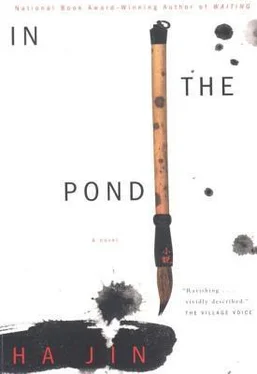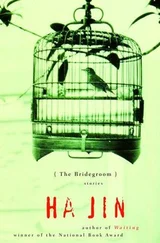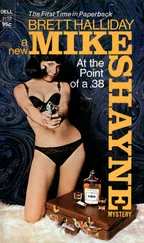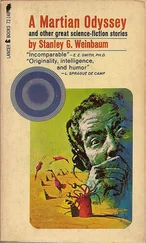Ha Jin - In the Pond
Здесь есть возможность читать онлайн «Ha Jin - In the Pond» весь текст электронной книги совершенно бесплатно (целиком полную версию без сокращений). В некоторых случаях можно слушать аудио, скачать через торрент в формате fb2 и присутствует краткое содержание. Год выпуска: 2014, ISBN: 2014, Издательство: Knopf Doubleday Publishing Group, Жанр: Современная проза, на английском языке. Описание произведения, (предисловие) а так же отзывы посетителей доступны на портале библиотеки ЛибКат.
- Название:In the Pond
- Автор:
- Издательство:Knopf Doubleday Publishing Group
- Жанр:
- Год:2014
- ISBN:978-0-8041-5372-0
- Рейтинг книги:4 / 5. Голосов: 1
-
Избранное:Добавить в избранное
- Отзывы:
-
Ваша оценка:
- 80
- 1
- 2
- 3
- 4
- 5
In the Pond: краткое содержание, описание и аннотация
Предлагаем к чтению аннотацию, описание, краткое содержание или предисловие (зависит от того, что написал сам автор книги «In the Pond»). Если вы не нашли необходимую информацию о книге — напишите в комментариях, мы постараемся отыскать её.
Under the Red Flag, Ocean of Winds
Waiting
In the Pond — читать онлайн бесплатно полную книгу (весь текст) целиком
Ниже представлен текст книги, разбитый по страницам. Система сохранения места последней прочитанной страницы, позволяет с удобством читать онлайн бесплатно книгу «In the Pond», без необходимости каждый раз заново искать на чём Вы остановились. Поставьте закладку, и сможете в любой момент перейти на страницу, на которой закончили чтение.
Интервал:
Закладка:
Then he felt reluctant to present this piece to Song. Heaven knew when he could accomplish such a work again. On second thought, he decided to let it go, since he had already inscribed the dedication; besides, by coming here to help him, Song had contributed to its creation. You shouldn’t be too small-minded, Bin warned himself.
The next morning Bin came across Song in front of the office building in the plant. They glanced at each other without exchanging greetings, because they needed to appear to others as strangers in order to forestall the leaders’ suspicion.
As Song and Bin were passing each other, Liu happened to come out of his office, descending the stairs.
“Good morning, Secretary Liu Shu,” Bin shouted from a distance of fifty yards, waving as though they had been old friends. He did this for Song, to identify Liu for him; Song turned to look at the stocky leader.
Apparently Bin’s warm greeting frightened Liu. He halted on the stairs, speechless and bulgy-eyed, then turned around and hurried back toward his office. Bin saw Liu’s surprised face, and he gave a hearty laugh, swaggering away. The laugh shook Liu’s heart.
God knew what made that lunatic so happy today. Something must have been going on. Suddenly Liu remembered his grandson, and cold sweat broke out in his armpits. He was in the middle of a meeting and couldn’t go home, so he hastened to Finance and begged Nina, almost with tears, to go tell his wife to take the boy out of the plant’s childcare center and watch him carefully at home today. Damn this mad dog Shao Bin! If only they could have slammed him into jail.
The fear on Liu’s face pleased Bin a lot. While filing a brass faucet in Maintenance, he couldn’t help humming a folk song. His fellow workers asked him why he was so different this morning. He told them he had had an auspicious dream the night before, with whales and a boat that carried him into the blue ocean. Asked further, he wouldn’t explain what this meant but kept smiling mysteriously. “What a superstitious bookworm,” they said behind his back. At lunch he bought a good dish — fried tofu cubes mixed with pork and leeks — and also a mug of beer.
He felt nobody in the world could subdue him after he had painted “Execute the Devils,” which ought to be a masterpiece. Probably this work would survive him and become a sought-after treasure, passing through generations to posterity. It was too bad that Song would have it; otherwise he would have sent it to the National Gallery in Beijing. If they accepted it, he might be able to go to a university, not as a student but as a lecturer or a professor, just like the cobbler who had recently been invited to teach math at a major university on the strength of his inventing a method of rapid calculation.
In the evening Song came again. Bin talked about the leaders’ breaking their promise to let him go to college and then about Liu’s lifestyle. He insisted that somebody had seen Liu and Nina lying in each other’s arms on the bank of the reservoir near Quarry Village, and that they went to the waterside every Sunday afternoon. On their way there Liu often bought her grapes, or sweetmeats, or boiled periwinkles, or steamed mantis shrimps. Bin defined the affair thus: “Liu Shu purchases her thighs with power. That’s why Hou Nina was given a new apartment and got a raise each year.”
After their talk, Bin took out “Execute the Devils.” Song looked excited by the painting and said, “Comrade Old Shao, thank you for trusting us.”
His words puzzled Bin. Bin said, “I painted this for you, to express my gratitude, yes, also my trust.”
“We’ll cherish it and hang it in our editorial office.” Song rolled the painting up and put it under his arm. He slung his duffel onto his back, getting ready to leave for the ten o’clock train.
They shook hands and said good-bye.
Bin felt mortified by the rough way Song had handled the painting. It seemed Song took it as something like a poster and obviously wouldn’t mind sharing it with anyone. Now Bin began to doubt Song’s character; at least he no longer took him for a good friend. You shouldn’t play the lute to a water buffalo, he said to himself. Without doubt Song was ignorant of the fine arts, unable to appreciate real work.
Twelve
HAVING READ SONG’S report on Bin’s case, Jiang Ping, the editor in chief of Environment , felt that after minor revisions he should publish it. Though the newspaper was designed mainly to bring natural environmental issues to people’s awareness, it would be better if once in a while it published something about the social environment — to reduce moral and cultural pollution.
Two weeks later the report came out on the front page of Environment with the title “The Legend of Shao Bin.” It consisted of four long sections: first, “A Conscientious Artist”; second, “Persecutions After Two Cartoons”; third, “In the Face of the Abuse of Power”; fourth, “A Cry of Blood and Justice.” In addition to the thirty-five hundred words, a photograph of Bin, three inches by two, was printed in the first section, and the cartoons about housing and bribery appeared in the middle of the article. There were also the prints of two seals carved by Bin in the Worm Style; one said, “Eliminate the Wicked and Enhance the Good,” and the other, “Justice Will Prevail.” The sentences in the article were trenchant, emotional, now and then invigorated by a pair of exclamation marks. Never had Environment looked so lively.
The minute the newspaper came off the press, Yen sent two copies to Bin by the express mail.
On reading the article Bin burst into tears, which scared his daughter. She dropped her bottle and ran out of the room, shouting, “Mommy, Daddy’s crying.”
Meilan rushed in with an iron ladle in her hand. Seeing the half-filled bottle lying on the dirt floor, she became angry, about to yell at Bin. But he smiled and handed her a copy of the newspaper, saying, “I got them! Caught them all in one net.”
She took the paper and hurried back to the kerosene stove, on which a wok of celery and potato slivers was sizzling. She left in the room an aromatic puff of scallion, fried with soy sauce.
To Bin, the best feature of the article was its broad scope — no relevant detail was left out. There were twelve places where Secretary Yang’s name was mentioned. At one point, the author even questioned him directly: “As the head of the commune, you didn’t make any effort to correct the wrong done by Liu and Ma, but instead you connived with them. Where is the principled stand of a Communist? How could you forget and maltreat the people who put the power in your hands? We advise Comrade Yang Chen to think this over.”
Bin perused those powerful sentences several times and was convinced that whoever read the article would feel that the indignation was honest and justified. This time Secretary Yang could not feign innocence and remain behind the scenes; he had to face his crimes and pay for them.
After supper Bin cycled to Bank Street and stuck the article, with twelve thumbtacks, to the propaganda board in front of the Commune Administration. From there he went directly to the plant to post the other copy. It was too bad that Yen had mailed him just two copies; if only he could have kept one for his own records.
When Bin arrived at work the next morning, the newspaper had vanished from the notice board. At first he was outraged, but seeing some workers grin at him knowingly, he felt a little comforted. One of them said, “Bin, you looked so handsome in the paper, like an eighteen-year-old.”
Another asked, “Did you get paid for the article? How much a word?”
What a silly question. Bin didn’t bother to answer, reluctant to admit he wasn’t the author and had got no pay for the writing.
Читать дальшеИнтервал:
Закладка:
Похожие книги на «In the Pond»
Представляем Вашему вниманию похожие книги на «In the Pond» списком для выбора. Мы отобрали схожую по названию и смыслу литературу в надежде предоставить читателям больше вариантов отыскать новые, интересные, ещё непрочитанные произведения.
Обсуждение, отзывы о книге «In the Pond» и просто собственные мнения читателей. Оставьте ваши комментарии, напишите, что Вы думаете о произведении, его смысле или главных героях. Укажите что конкретно понравилось, а что нет, и почему Вы так считаете.






![О Генри - Пимиентские блинчики [The Pimienta Pancakes]](/books/407355/o-genri-pimientskie-blinchiki-the-pimienta-pancake-thumb.webp)





